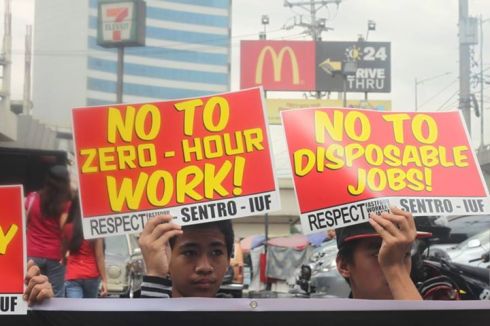Unite Union has welcomed the 50 cent an hour increase in the minimum wage but says that no matter what level the minimum wage reached it is of little benefit unless it is combined with an end to zero hour contracts.
Unite is calling on the government to set a target to have the minimum wage progressively increased from its current level of about 50% of the average wage to two-thirds of the average – which was the standard in New Zealand in the past.
The entire benefit of a pay rise can be lost for someone on around 20 hours a week if they lose only one hour’s pay. We will be taking a claim for guaranteed hours to be the norm in the negotiations this year with fast food companies and others who have most staff working under what have been dubbed zero-hour contracts because they have no guaranteed minimum number of hours.


 A major survey of fast food workers in New Zealand has
A major survey of fast food workers in New Zealand has











